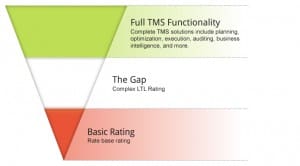“I want to know the real, total cost of my shipments before I make them.” Over the years, we have talked to a lot of shippers and logistics companies who are in the “rating gap.” These shippers don’t need a full TMS, which includes sophisticated planning and execution, but clearly require a highly-functional contract management system or service to determine their expected real total freight cost.
What is the Gap?
Here is a diagram of where and why the rating gap exists. This “Gap” has been very difficult to bridge because complex rating is so difficult that only a TMS with sophisticated rating capabilities can deliver solid “total costs” estimates.

To get correct cost or up-charged sell rates, you can start with basic rating, but you’ll have to know a lot more. You also have to take into account some basic pricing parameters, such as:
- Type of freight cost – rate base, pallet, mileage, cube, area, flat rate, etc.
- Client routing requirements
- Geographic limitations
- Direct or Interline Service
- Accessorial charges
- Client Requested Accessorial charges (i.e. Liftgate, Residential Delivery)
- Automatically Added Accessorial Charges (i.e. Fuel Surcharge, High Cost Delivery Areas)
Here are common reasons why you need the real total costs:
- Properly accrue your shipment costs for accounting reasons (i.e. reporting or Sarbanes-Oxley compliance).
- Provide your customers with accurate shipping choices in the sales process.
- Manage markups to your customers.
- Make sure you are not going to lose money on free shipping offers to customers.
- Provide vendors with a simple web portal to determine correct mode and carrier.
Why does the Gap Exist?
The major issue is that LTL shipments are really hard to correctly rate. Too many shippers are relying on base rates (e.g., YRC 2013) to get a good approximation. This rarely yields anything close, and the difference between expected charges (based on base rate) and actual total charges is usually 20 to 200 percent off. It’s so difficult that a whole industry exists to audit freight bills from carriers because so many are significantly different from the expected charges.
In addition, many TMS solutions lack sophisticated rating capabilities. Also, TMS vendors are not really incentivized to decouple their rating engine and contract management system from the TMS, which forces some shippers to buy more than what they need just to get rating capabilities.
Should I Care About the Gap?
Yes, a valid question because complex issues take time to consider. But here are two examples of what happens inside the Gap, beyond the base rate:
2000 lbs., Atlanta to New York City, 3 pallets:
Base rate: $ 375.96
Real cost: $ 740.26
2000 lbs., Atlanta to New York City, 4 pallets:
Base rate: $ 376.96
Real cost: $ 1,213.26
I won’t get into the details for above, but if interested, I have placed these examples on our website.
In Closing: Some Numbers
ERP and TMS systems do not have a good track record in regard to contract management technology. In fact, a survey in American Shipper (Transportation Procurement Benchmark Study 2013) shows 60 percent of small/medium shippers are using manual/spreadsheet for contract management and only 4 percent of these shippers are using the contract management module of their TMS.
The fact that less than 40 percent of shippers even use a TMS is also related to this gap. I believe there are plenty of shippers who either have not found a suitable TMS or don’t want to buy a full system just to do comprehensive rating. A sharper point is that most TMS technology is not capable of such rating, or else more than 4 percent of shippers would be utilizing their TMS’ contract management module.
Do you see this gap in the industry? I’d love to hear your comments and input.
Geoff Comrie is Vice President of Business Development at 3Gtms. Geoff founded Transite Technology in 2002, and led the company from inception until the merger with 3Gtms in early 2013. Over the years, Comrie has attained a recognized level of expertise on LTL rating, and is a frequent speaker and discussion contributor on this topic. He has twenty years of experience in technology sales and management, with companies such as Pansophic and Siemens. Geoff is a graduate of Western Illinois University with a bachelor’s degree in computer science.
















